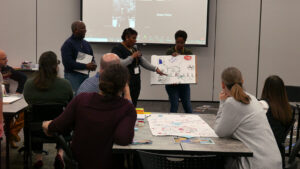Tarboro Community Garden: Increasing Food Equity and Positive Health Outcomes
Rural, lower income, and BIPOC communities are disproportionately affected by food insecurity and related chronic illnesses

Compared to state averages, Tarboro, NC is affected by higher rates of chronic illnesses such as obesity, diabetes, heart disease, and food insecurity. Tarboro is located in Edgecombe County, the most economically distressed in the state, which also hosts the lowest proportion of food retailers selling fresh produce in the Upper Coastal Plain region (<20%). Despite being in an area that boasts high agricultural production, very little of the available cropland is in vegetable production. Because of extreme flooding, there are also large parcels of vacant land that were bought out during disaster relief efforts and are now available for non-development uses.
Freedom Org is collaborating with members of the Food and Fitness Opportunities Research Collaborative (FFORC), leaders of the environmental justice movement, community partners, and the town of Tarboro to create a community demonstration garden that will both nourish and empower the community. Community demonstration gardens have been shown to alleviate negative health outcomes by encouraging community engagement, educational opportunities, increased health access, and improved food sovereignty. The act of growing food in a shared setting, with the intention of it feeding the community, allows generations to work together and learn from one another while increasing direct access to healthy fruits and vegetables. Communal gardening can also improve both the physical and mental health of those who participate in addition to supporting food literacy and engaging in local food systems.
Together, we can increase healthy food access and foster sustainable local food system models through community demonstration gardens.
Proposed Aims:
- Convert underutilized land into a community demonstration garden.
- Increase equitable access to fresh, healthy produce for the community.
- Increase fruit and vegetable consumption among gardening participants.
- Increase food literacy and food sovereignty.
- Improve physical and mental health outcomes within the community.
- Create sustainable partnerships between community members, academic partners, and local municipalities.
Community-Academic Partners
This project will be led by the following Edgecombe community members and UNC faculty:
Freedom Organization
ImpactOne Inc.
Center for Health Promotion and Disease Prevention
Center for Health Promotion and Disease Prevention
Related Community Events
Events are subject to change. Please check back prior to the event or contact the event coordinator for additional details.